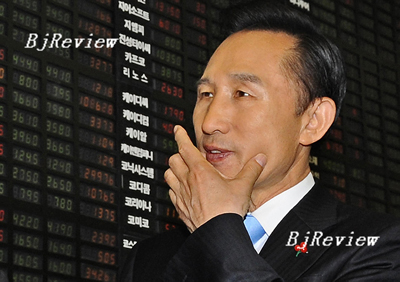|

Lee Myung Bak's career is a legendary success story that enjoys broad recognition from South Koreans. The country's new president-elect was born to a poor family in south South Korea but ascended to the top spot of the country's largest conglomerate company. He went on to become mayor of Seoul and is now about to become the country's next president.
Lee's ambition is part of the reason why he won a landslide victory in the country's recent presidential election, Chinese foreign affairs experts said. As the first former South Korean CEO to be elected president, Lee is expected to fine-tune South Korea's relations with foreign countries in a pragmatic way while concentrating on reviving the country's economy, they said.
Lee of the conservative Grand National Party was declared the winner of South Korea's presidential elections on December 19. With 49 percent of the vote, he secured the biggest victory margin in the 20-year history of country's democratic elections. His closest rivals, Chung Dong Young of the liberal United New Democratic Party, received 26.1 percent, and independent candidate Lee Hoi Chang secured 15.1 percent, according to final figures released by the National Election Commission.
Rising from the grassroots
Since Lee made his way up to rank of the elite class through his own efforts, voters find him more acceptable than career politicians, said Zhang Liangui, a professor specializing in Korean studies at the Institute of International Strategic Studies at the Party School of the Central Committee of the Communist Party of China.
Lee is a capable leader who is strongly motivated, Zhang said. He became an executive at Hyundai Engineering and Construction Co. Ltd. in his thirties and helped turn it into South Korea's largest conglomerate company. When he left as chairman in 1992, Hyundai had more than 160,000 employees worldwide, compared to 90 in 1965, the year Li started at the company.
Lee is also famous for his stint as Seoul's mayor from 2002 to 2006, during which he transformed the city's landscape with the restoration of a buried downtown stream and revamped its public transportation system.
The incumbent government's many failures also facilitated Lee's election victory, Zhang said. South Korea's annual economic growth has slowed considerably since current president Roh Moo Hyun took over in 2002. Many South Koreans are complaining about the widening wealth gap and heavy burdens of employment, housing and education.
On the diplomatic front, South Korea's relations with the United States have hit a low point in recent years, whereas its "sunshine policy" on North Korea has been futile with South Korea's contributions far outweighing its own gains, Zhang said.
Lee set forth his economic goals in the "747 plan" in his election campaign. He pledged to achieve an annual gross domestic product (GDP) growth of 7 percent during his presidential tenure and make South Korea the world's seventh largest economy in 10 years with its per-capita GDP increased to $40,000 in the same period. South Korea is currently the 13th largest economy in the world with a per-capita GDP of about $20,000.
A results-oriented approach
With a strong business background, Li values practical benefits, Zhang said. He will forge a closer alliance with the United States to safeguard South Korea's security under the U.S. umbrella. He also said he would improve the country's relations with Japan to attract more Japanese investments. Trilateral cooperation between the three countries is expected to make headway, Zhang said.
Li is likely to drop the "sunshine policy" on North Korea, Zhang said. Instead, he said he would try to secure more economic and political gains for South Korea in its cooperation and exchanges with North Korea with a focus on mutual benefits.
Despite some problems such as disputes over historical issues, China-South Korea relations have developed in a healthy manner during Roh's presidency, Zhang said. Although Lee belongs to a conservative, right-wing party, he will not downplay the importance of these relations.
"Lee, a pragmatist who underlines economic development, is bound to set great store by South Korea's relations with China, a country with which it has extensive economic ties," Zhang said. The two Asian neighbors will carry out more substantial cooperation in various fields in the coming five years, he added.
While meeting with China's ambassador to South Korea after his election, Lee said that his incoming administration would make positive efforts to strengthen bilateral ties with China, Xinhua News Agency quoted a Chinese embassy official as saying.
Lee also thanked China for its role in pushing forward the six-party talks aimed at resolving the North Korean nuclear issue. South Korea expects further communication and closer cooperation between the two sides on the nuclear issue, he said.
Lee will take over as president on February 25, but he will a face major legal challenge before finally moving into the presidential Blue House.
On December 26, South Korea's cabinet approved a bill that sets up a fraud inquiry into the president-elect. A special prosecutor will lead an investigation into allegations that Lee was involved in a securities company called BBK, which is suspected of defrauding investors of millions of dollars. The special prosecutor is due to report the investigation's findings just days before Lee's inauguration.
The validity of Lee's election victory will be questioned if his involvement in the fraud case is confirmed, said Qi Baoliang, a research fellow at the China Institutes of Contemporary International Relations. Even if the investigation finds evidence to implicate Lee in the alleged fraud after his inauguration, it will still cast a shadow over South Korea's political situation although Lee himself will be immune from prosecution as president. In any case, South Korea will not be politically stable until next April, two months after Lee assumes office, Qi said.
| 